
Paullinia is a genus of flowering shrubs, small trees and lianas in the soapberry family, Sapindaceae and typical of tribe Paullinieae. It is native to tropical South America, Central America and the Caribbean.

Linaceae is a family of flowering plants. The family is cosmopolitan, and includes about 250 species in 14 genera, classified into two subfamilies: the Linoideae and Hugonioideae. Leaves of the Linaceae are always simple; arrangement varies from alternate to opposite or whorled. The hermaphroditic, actinomorphic flowers are pentameric or, very rarely, tetrameric.

Cissus is a genus of approximately 350 species of lianas in the grape family (Vitaceae). They have a cosmopolitan distribution, though the majority are to be found in the tropics.

Bertya is a genus of plants in the family Euphorbiaceae first described as a genus in 1845. The entire genus is endemic to Australia.

Symphonia is a genus of tropical woody plants, specifically trees in the family Clusiaceae. The genus has its diversity center in Madagascar and one species disjunct in the Afrotropic and the Neotropic in the Amazon Rainforest.

Cleome is a genus of flowering plants in the family Cleomaceae, commonly known as spider flowers, spider plants, spider weeds, or bee plants. Previously, it had been placed in the family Capparaceae, until DNA studies found the Cleomaceae genera to be more closely related to the Brassicaceae than the Capparaceae. Cleome and clammyweed can sometimes be confused.

The genus Cayratia consists of species of vine plants, typical of the tribe Cayratieae. Some of them are useful, and they are found in tropical and subtropical areas of Asia, Africa, Australia, and islands of the Pacific Ocean.
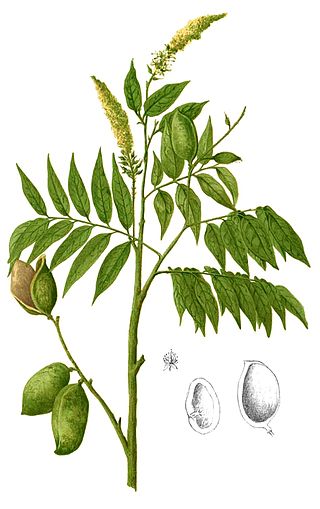
Crudia is a genus of plants in the family Fabaceae.

Serianthes is a genus of flowering plants in the family Fabaceae. It includes 17 species of trees and shrubs which range from Thailand and Malesia to Papuasia and the South Pacific. New Caledonia has the greatest diversity of species, with six endemic species. Typical habitats include tropical rain forest, scrub forest, coastal scrub, and rarely open wooded grassland.

Arachnothryx is a genus of flowering plants in the family Rubiaceae. It contains about 107 species. It is found from Mexico to Peru and in Trinidad.
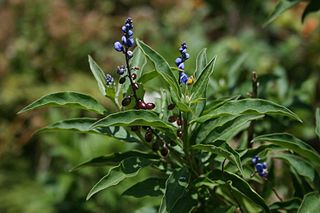
Monnina is a genus of flowering plants in the family Polygalaceae. There are 150 to 200 species distributed throughout the Americas from the United States to Patagonia. It was named after José Moñino, 1st Count of Floridablanca.

Picramnia, the bitterbushes, is a genus of flowering plants generally placed in the family Picramniaceae, but sometimes included in Simaroubaceae. The name is conserved against the genera Pseudo-brasiliumAdans., and TaririAubl., both which have been rejected.

Drosera sect. Ergaleium is a section of 26 species that are erect or scrambling tuberous plants in the genus Drosera. This section represents a natural group and are taxonomically monophyletic.
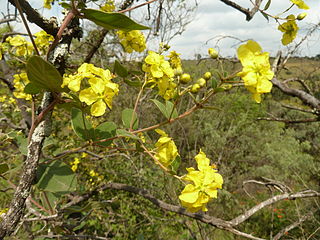
Sphedamnocarpus is a plant genus in the Malpighiaceae, consisting of some 10 to 18 species. They are native to Sub-Saharan Africa and Madagascar, and may be subshrubs, shrubs or climbers. Their mostly yellow flowers have 5 sepals and 5 petals. The 3 to 4-locular ovaries develop into samaras.
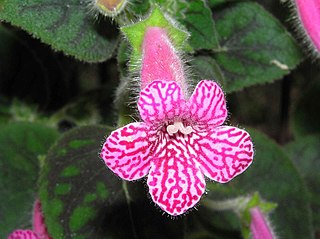
Kohleria amabilis, the tree gloxinia, is a species of the flowering plant belonging to the family Gesneriaceae.

Connarus is a genus of plants in the family Connaraceae.
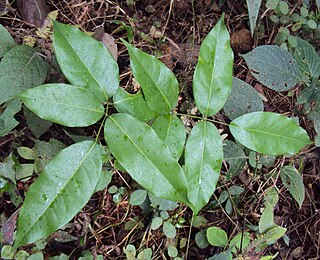
Rourea is a genus of plants in the family Connaraceae. They are found worldwide across the tropics and subtropics.

Rhaphiostylis is a genus of flowering plants belonging to the family Metteniusaceae.
Hebepetalum is a genus of flowering plants belonging to the family Linaceae.


















